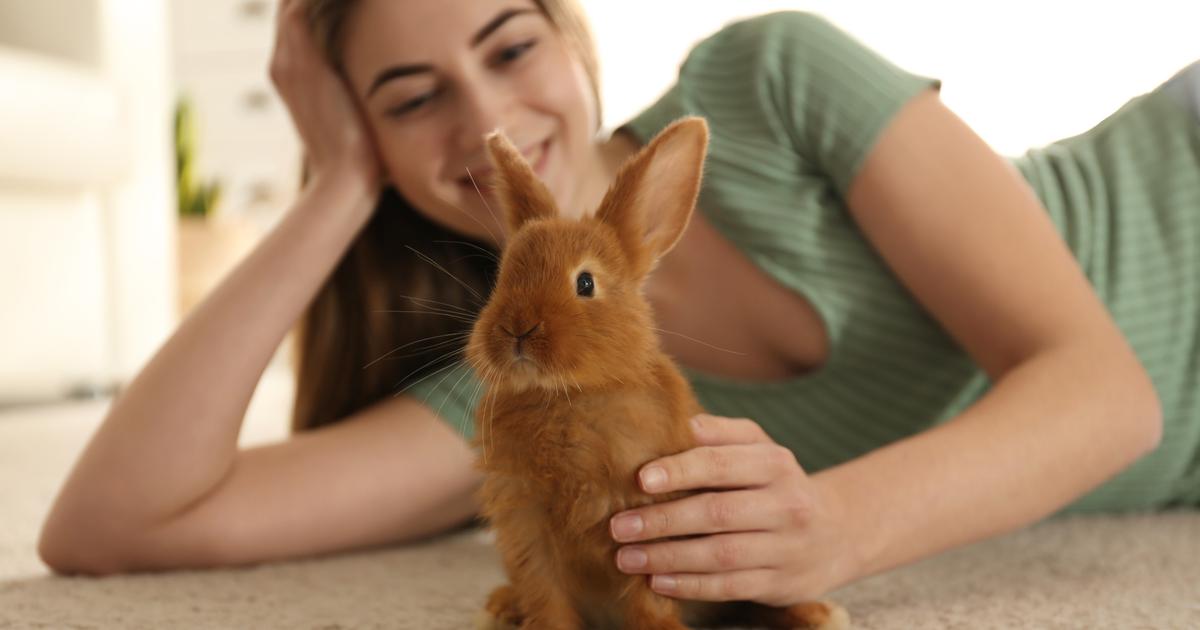Rabbits
are
particularly clever, intelligent and sociable little animals.
With a little patience, it is possible to teach them potty training and even a few tricks.
When to start training a rabbit?
The education of the rabbit should begin from the first days of his arrival at home.
Although it requires a little patience, its education is essential for its well-being, but also for a good understanding between your domestic rabbit and the members of your household.
The rabbit can be educated from its 4 months.
Indeed, it is at this age that the rabbit assimilates most quickly what he has the right to do or not.
For an adult rabbit, it is necessary to practice a gentle education.
Assume that you have to relearn everything.
Once educated, your rabbit will be able to sleep on the living room carpet or on the sofa without special supervision.
And as soon as he feels the need to urinate, he will hurry to go to his litter box to relieve himself, even if it is in another room of the house.
On the other hand, a rabbit whose education has been neglected is not always clean, it can also start biting everything it finds, can become noisy at night and impossible to catch or even aggressive.
Read alsoDwarf lop rabbit: character, size and price
How to potty train a rabbit?
Generally, animals are instinctively clean.
In the wild, for example, wild rabbits never defecate inside their burrow, but outside their habitat.
However, your house can turn out to be a vast territory for a rabbit, he may have some difficulty understanding the boundary between his living space and his “
toilet
” corner.
To teach your rabbit cleanliness, you must delimit a space dedicated to its needs.
As for cats, it is possible to use a suitable litter box.
Preferably choose an absorbent, comfortable and toxic-free litter.
To assimilate this space to its needs, initially limit its exits.
Confine it to small spaces near the litter box.
If he does not assimilate the litter box to his space needs, pick up his droppings with a small shovel and put them in the litter so that he understands.
When you catch him doing things outside the box, put it in.
Good to know
Rabbits like to have clean toilets.
Change the litter box every 2 days preferably.
Finally, all learning requires encouragement and rewards.
Do not hesitate, when your rabbit naturally relieves himself in the litter box, to congratulate him with hugs and a few treats.
Good to know
It is only once potty trained that it is possible to train your rabbit to be potty elsewhere.
????
In the garden or in other areas of the house, for example.
Read alsoHow to choose a rabbit hutch?
How to teach him not to nibble everything he finds?
In the wild, rabbits need to teethe, so nibbling is instinctive for them.
For their safety and during the first days of the rabbit's arrival, put electric wires and green plants out of reach, to avoid any electrocution or poisoning.
As a reminder, plants toxic to rabbits are:
Foxglove Honeysuckle SumacColchiumElder Cherry LaurelAtropaTulip Lily | Crocus Lily of the Valley Narcissus Daffodil Oleander Larkspur Iris Fir Hyacinth |
To make a rabbit understand that snacking is prohibited, it is better to provide him with various objects/toys to nibble on, such as wooden bundles, hay cubes or even cardboard, so that he leaves aside your furniture.
Do not hesitate to dispose of it everywhere so that he can also take care of himself and exercise.
You can also say a firm "NO" as soon as you catch him nibbling on furniture, but there's no need to punish him.
If the word "no" doesn't work, it's also possible to poke his nose with your index finger.
Read alsoGarden: which plants are not devoured by rabbits?
Gestures and attitudes to avoid
Whatever rules you want to instill in your rabbit, it must be treated with respect, kindness and gentleness.
If you catch him, for example, chewing on a chair or urinating outside his litter box, you shouldn't opt for punishment.
Under no circumstances should you lock him in his cage or raise your voice against him.
Indeed, if you raise your voice, he risks becoming fearful, even aggressive and losing confidence in you.
And locking a rabbit in a cage is like equating this “secure” space with a place of punishment.
This will cause a great source of stress for him.
Finally, under no circumstances should physical punishment be practiced.
Never grab a rabbit by the ears
, it hurts him.
If you are having difficulty raising your rabbit, it is advisable to consult a rabbit behavior specialist or seek the advice of a veterinarian.
Adopting an animal commits you, it is a decision that you will have to think carefully about. Do not hesitate to contact your veterinarian or the shelter closest to you before starting. They will be able to advise you on the animal that will suit you best.















